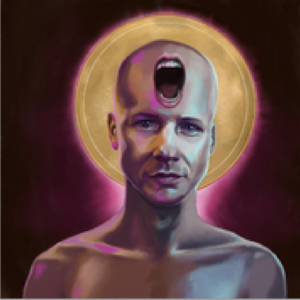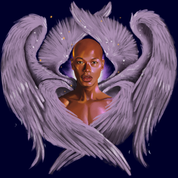You will find spoilers here. And some chaos. Depending on your preferences, you might not want to read this until you’ve finished Anthem Homunculus, John Cameron Mitchell’s musical dystopian drama full of heart, delivered via podcast, like an old radio play.

I interviewed Mitchell for a piece in Psychology Today, about brain stuff at the heart of his new project, Anthem Homunculus, I didn’t want to give away revelations of the plot, so I’m doing that here. More importantly, my conversation with Mitchell was pretty juicy, on the topic of the brain, but also about making art in the time we’re living through. So I’m sharing some of that here.
Mitchell finds a lusty way to assert a literary lineage for his work. His protagonist, Caean, is trying to seduce Jairo, a lover of Walt Whitman who will become his boyfriend. “Whitman actually kissed Wilde,” he tells Jairo. “And Wilde kissed André Gide, who kissed Forster, who kissed Christopher Isherwood, who kissed Jean Genet, who kissed William Burroughs, who kissed me.” So, basically, kissing Caean will be like kissing Whitman–and all of them.
“But nobody kissed James Baldwin,” Jairo replies. He’s not a character who lets shit go.
“I would have kissed James Baldwin,” Caean replies. Jairo, who’s South African–literate in both race relations and shade–accuses him of being a sex tourist. And then kisses him. Anthem revels in contradictions like this on. We’ll get to that. But first, a little more about Caean’s brain tumor–again, played by Laurie Anderson. It’s really not possible to announce that fact enough.
The tumor gives Caean hallucinations. In our interview, Mitchell said something that sounded a description of what I’m always playing with in my writing: “Everything is real if it affects you. If hallucinations affect his life, they’re as real as life.”
 It’s an idea Mitchell has been exploring at least since high school:
It’s an idea Mitchell has been exploring at least since high school:
I was always obsessed with the brain. In fact, my very first short story in highs school was called “The God Eye.” It was a woman who worked in Renassiance fair who had a stroke, and one of her eyes would randomly move aroudn. She decided that God was making that eye was trying to try to tell her stuff–that’s somebody she should talk to, that’s something she should do. It was random movements of the eye, but she decided it was her God eye. Interestingly when I presented the script to a couple of oncological neurologists, both of them pointed to Julian Jayne’s book The Bicameral Mind. The spot that I actually had located my tumor coincidentally was the part of the right brain that James posited was The Language Center for the God Voice. His hypothesis was that before written language, we had fewer connections between the bicameral brain, and hte right side being the more morality, poetry, and ethics. He posited that this was a language center for early man, and we would get auditory hallucinations from there–i.e., a God voice. So weirdly, all of these things coincided with a guy who has a tumor who speaks to him, gives him hallucinations, and demands to be called God. It was a happy coincidence.
Art by Or Gotham
Now, for the spoiler. Caean’s is no ordinary tumor. It’s a teratoma. We don’t learn the fullness of its extraordinariness until episode 7. A teratoma is a tumor composed of other body parts, usually hair, bone, and muscle.
Rare variations of a teratoma–fetiform and fetus in fetu–can develop a creature very much like a fetus, including organs, limbs, sometimes even a spine. Caean’s teratoma is a fetiform, “a term that has been given to a rare form of teratoma that resembles a malformed fetus.” If you thought Anthem was fantastical or science fiction, like I started to, take a breath, like I’m doing now. Fetiform and fetus in fetu “tumors” are real. They generally grown in the lower spine or behind the belly. As Mitchell told me, “Caean is the first pregnant man.”
As the story develops his tumor continues to grow body parts, including two living brains. There’s a question about whether he can live with it, even though it’s giving him hallucinations, sometimes apparently transporting him to other dimensions, where he has difficult conversations with his brother, who died when they were kids, pretty much destroying his family.
There’s a question about whether the tumor / God / Laurie Anderson could survive outside his body. His neurosurgeon (played by Marion Cotillard) is atwitter with the scientific possibilities. “Originally this was a Hedwig sequel,” Mitchell explained, “the myth of the other half became internal. A fetiform teratoma, which is the more developed kind, which neurologists told me or generally more like clones than parasitic twins. I think the parasitic twin is sort of a very rare thing. But the whole idea of your other half being inside you and being kind of a fucked up or perhaps a neglected part of me was just fascinating to me.”
It’s a punk move to turn a brain tumor into a fetus–inside the first pregnant man–to push one of the slipperiest questions in the history of science: What is life, anyway? Queer artists known for their revolutionary politics aren’t supposed to go there. The question belongs to the religious right. It’s dangerous, used to police women’s bodies and shut down abortion clinics. But punk doesn’t care. It’ll wrap a cultural conundrum inside out. That’s what Mitchell does.



People are afraid right now. We’re afraid of our government. We’re afraid of each other. We’re afraid across divisions like left and right, but we’re also afraid among like-minded people–afraid of saying, or thinking, the wrong thing. It’s exhausting and debilitating. We could use a dose of punk humor to help us out of this mess. “I’m from a generation that grew up with AIDS. The other was anybody who could contract AIDS. The idea of being othered is deep in my soul,” Mitchell commented. “And very much a part of my work. My work is very nuch about creating communities of outsiders, in order to be loved, but also to make work that can be useful to the mainstream, or as many people as possible. I like things to be entertaining.”
To make things–to contribute something useful to a culture in crisis–requires all kinds of risks. One of the many risks Mitchell takes is through loving parody of woke activist culture, but he contextualizes that parody. His affectionate toward the characters he presents as well-intentioned but misguided.
So you can see in my piece I get a little annoyed with people, in their good intentions to redress harm and create restorative justice and even restitution, they feel the need to focus so much on categories and identity.” For Mitchell, a better question than “what you are” is “What do you got? What are you brining to the party?”
“Part of my work is about understanding differences,” he explained, “but also trying to reduce them, trying to find things in common. And I do it through art. There’s a line the character shouts out, ‘People who read fiction have more empathy than people who read the news. I read that on Huff Po, and it really moved me.’ We are getting to a point where the we less we believe in those facts the more these stories are important.”
Mitchell is eloquent on hot topics that seem to be eating our culture alive from the inside (perhaps like a talking tumor?). As an artist, he’s got a lot to say about appropriation, censorship, political debate, and even Milos Yiaonnopoulos (a character he plays on television). I’m going to end this piece with Mitchell’s wisdom–or what may feel like provocation to some. If it does provoke, I think he’d agree, one of an artist’s jobs:
I’m a storyteller, you know, and I will write a story about a character who is not like me because I want to understand, because I want to feel. I want my actors to add to that story. Tell me what they know. The character of Jairo is the guy from South Africa. I’m like talk to me. Where did you come from? Is this interesting to you? How about this line about colonization? How about this line about midwestern woke, you know where they street is called Dodge and they renamed it after another non-slave? He laughs at that–at lazy activism.
He’s like, but let’s talk about it. Let’s create characters that are not us. Others might say this is appropriation, or that all fiction is suspect. But we all know we all know the objections to appropriation, which is in effect is an objection to lazy art. It’s kind of plagiarizing more than appropriation.
I’m not a censorship guy, but there’s a lot of stupid and and lazy stuff. I don’t think it needs to be shut down. I don’t think it needs to be pulled from publication. I think it needs to be discussed, challenged, parsed, loved hated, you know, whatever. It’s like all out on the table, you know, and so I do get annoyed when people’s responses to injustice is imitating the actions of the oppressor: censorship, policing, separation, dividing and conquer. You know, Jeb Bush, who’s hoping to sneak in next, and Trump, are laughing, as liberal people are tear each other apart. They’re loving it.
There was a line that was cut–‘the arch conservative and the arch liberal both got shit on by their dad. The difference is the conservative thought he deserved it.’ They’re both reacting strongly against somebody who messed them up. Another line is ‘It’s the, unloved who change the world.’ Trauma, unfortunately, is the agent of change. But my change tends to be more towards seeking commonality, as opposed calling out, canceling, shutting down, censoring. For the power of good. Making as opposed to erasing, alternative as opposed to criticizing.
It’s easy to criticize everything right now. It’s very hard to create an alternative. It’s lazy activism to just say, ‘shut them down, cancel their book contract. Even Milo Yiannopoulos, who I abhor (and who I play on The Good Fight), had a point about censorship. He’s a toadie to the right and an opportunist and repulsive. But he also was right about certain Ivy Leagues and universities shutting down dissent or discussion of complexity.”

